My routine is a 0615 wakeup, 0630 jogging expedition, 0700 shower and ready, 0720 breakfast, 0745 travel to work. Then the day just flies and we come home at 1900 hrs. During the day, my work is mostly desk work – I do not have any field projects. I compile and edit reports, collecting data from the various field offices, facilitating communication between this office and the satellite locations in the field or the other UN agencies.
But when you are in Southern Sudan, collecting the data can be a job in itself!
The other day, I needed information on water and sanitation in Central Equatoria state. The first email to a UNICEF counterpart went out on week 1. He was out of the office and I was advised to contact the following week. The following week, I received no emails, and when I wrote to other colleagues in UNICEF (which took another few working days), found out that the gentleman *had* returned, but had gone out to the field. More waiting. I asked if someone in his department could forward me the data – it seems like they could, if I explained to them what I needed. I thought it is easier done face to face, so I set up an appointment. When the day and time came for the appointment, I made a vehicle request to go to UNICEF, but alas, there were no vehicles at the base (office)! I waited and waited – two vehicles had gone out on mission and so we were operating tightly on the rest. Grrrrr. Sigh. I missed the meeting of course … patience is a virtue. Another meeting had to be set up.
One would wonder why I didn’t call to postpone the meeting when there was no car – that is what any rational person would do – but that rational choice isn’t available to us in Juba. At UNHCR – and probably all the other agencies – there is no functional local phone line! There may be one or two in the entire office but that is to facilitate emergency calls to local businesses, travel agents, etc. You cannot just make a quick local call from your desk. Our phone lines have an international exchange – the operator is in Geneva, and so we have Swiss numbers! So in order for me to call UNICEF, I would have to dial out of Switzerland and based on where their exchange might be, make an international call. Bizarre! So email is most preferred. But that isn’t always reliable of course ... especially when your contact is away! UNICEF is just a 5 minute drive from our office, but to get there, I would have to request a driver and vehicle for an hour, have the paperwork for that approved, then find the vehicle dispatcher, and coordinate with anyone else that might be going in the same direction! One almost has to dread going out on errands!
So now I am just used to planning a week ahead of time if I need to go somewhere, and then adjusting plans on the day of travel … you can spend up to an hour trying to coordinating logistics to get somewhere or find something. I know I whine, but the best person to make friends with is the head driver (dispatcher)!
So days end up being very long and semi-productive, which is very characteristic of the UN I believe. I think I am now used to this style of work, and just relax and do things as I can. I don’t rush because the farthest I can rush is to the gate! Outside the office, we don’t go too many places. Travel in the evenings is restricted after 8pm because of security issues so it is a rare weekday that we go out to get pizza at The Village. On Friday evening we try and return home by 6pm, and on Saturday by 530pm because our weekly volleyball has to be played! That is it.
Restaurants in Juba are mushrooming, as in any post-conflict region with a heavy presence of international personnel. There are a few hundred internationals in this town, there’s the Nile running through it, and there are a lot of industrious Kenyan and Ugandan businessmen around. Put them all together, and you get riverbank restaurants! The restaurants are called camps – Mango Camp, Civicon camp, Global Camp, and so on – and they serve ambiguous continental food, and charge New York prices for it. But for lack of options, the hundreds of internationals are going here, and business is booming. There are new camps opening up every month! There is even a website that reviews them! While a French buffet in Juba sounds bizarre, that is exactly what you will find here to cater to UN professionals who are earning big bucks here. There are of course local restaurants, but most of them happen to be ‘out-of-bounds’ for security concerns...
A buffet at a nice Italian restaurant is around $25. And we pay it without blinking. This is why I say I am complacent now - $5 for a can of pringles, $7 for a bottle of tang. $6 for tinned chicken bologna, $200 for a hotel room (check out the Juba Post website – if you are a tourist, you had better have a thick wallet!), $1.50 for a can of coke, $4 for 2lb of basmati rice … you see what I mean. For breakfast supplies, we go to one of two local stores, where milk cartons are found if the day’s supply isn’t all sold out – a litre of milk is $2. There is no chocolate, but I’m sure someone will think of importing them shortly because we are happy to pay $9 for a box of Ferrero Rochers! I believe this is like Iceland where everything is imported – even our bottled water and our daily pineapple supply come from Uganda. Things are 4 times what they cost in the developed world… after a while you ignore the prices because you are so happy to find those items here at all! There is a distorted economy functioning here, and although I really don’t have a real sense for it, I hope there is a parallel economy for locals.
Living costs for internationals is sky high, although the arrangements are ‘modest’. UNHCR maintains a subsidized camp for its staff which is what saved me! Rent otherwise would be anywhere between $1000 and $1500 for a small apartment! And you would have to buy water from the Nile by tanks.
There is however a parallel system for internationals … it’s called the duty-free shop! Every UN mission has a PX where you can get essential items, imported, and sold without any duty associated with it! As soon as you enter PX, you are greeted by crates of canned Coke from floor to ceiling. There’s Fanta, Baileys and also Heineken. The rest are canned soups, Johnson’s lotion, Crest toothpaste, German chocolate wafers, chocolate chip cookies, mini-packets of basmati rice, sugar, flour, frozen chicken and whiskey. Isn’t that all you need? Our weekly highlight is a trip to the PX, to get our cokes and wafers at New York prices.
I think I’m also used to the various other oddities in life here like walking two minutes (outdoors!) to get to the bathroom at night, lizards at least the size of my palm, no local phone at work, no internet at home, no cellphone at all, no car to go anywhere after 6pm, and of course no money because my gratis service is running me a little thin! There are frogs that croak louder than barking dogs, rats and mice that will bore their way into your tent should you forget and leave a cookie or an apple inside the room, and our lighting-catcher in the camp is our tallest light post … the other day a Kenyan man died after being struck by lightning, so as a response, we designated our tall lightpost as our lightning catcher. I’m used to the fact that I eat the same cereal (bran flakes) every day for breakfast, eat pineapples every day at dinner, and eat rice every day of the week. At least someone is cooking for me! It is not unusual to stand in the dark in the shower to realize the power – which means water too – has gone out. We should all know how the electricity, water, heat and a/c work in the camp because there may be no one to fix it. Of course, in that case you may step up your indifference a notch and choose to ignore the fact that it is boiling hot and your a/c is not working.
Outside the camp, there are also many things to become used to – roads which have craters as large as the moon’s so that your car is never truly horizontal, puddles about ten feet wide when it rains, an inter-state bridge where cars can use only one lane because an overweight truck damaged the other side, hordes of horned cows who have right-of-way on the main road, streets that actually become smoother when it rains, UN land cruisers constituting about half the traffic in Juba, matatus in some parts of the town stuffed up to the window rims, men and women looking tribal, christian and muslim all at the same time, people with Christian first names, and Muslim lastnames, and a general mixing of African, Arabic, Muslim and Christian cultural influences. South Sudan has many churches, and it also has mosques. It has become a familiar feeling to hear the azaan in the evening as we play volleyball.
Not much else to report today. If something else strikes me as new, I’ll come back.

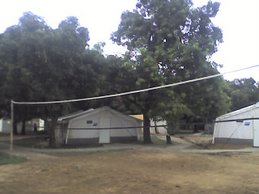
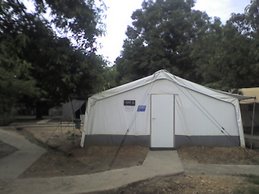
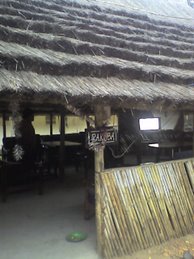
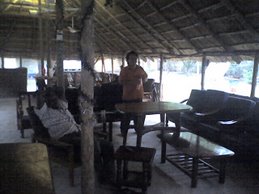
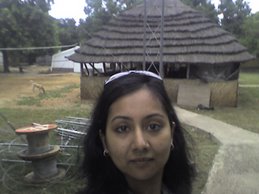
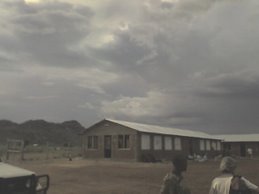

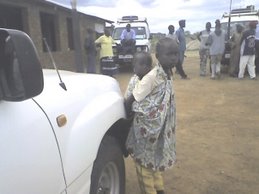
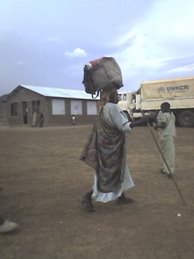
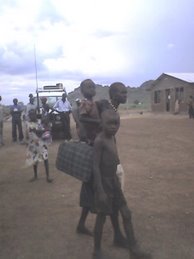
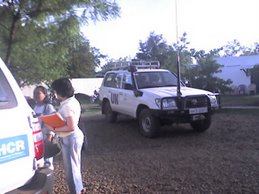
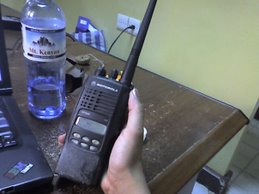
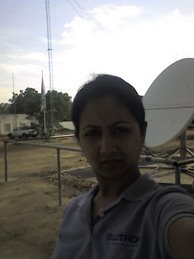

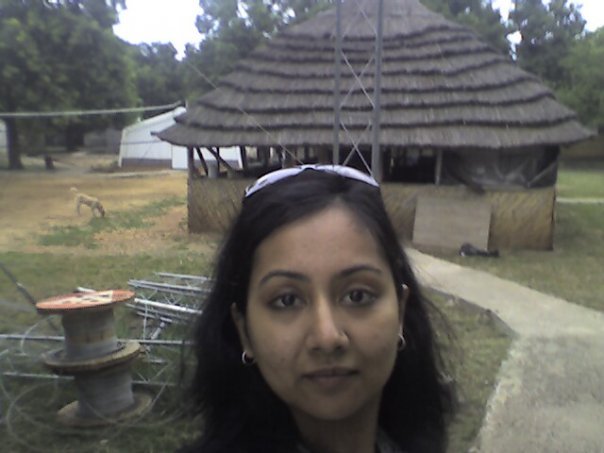
1 comment:
I enjoyed reading your piece and I believe it is a very honest picture of Juba. For a local like me, it's sad, funny and hopefull all in one piece.
"..men and women looking tribal, christian and muslim all at the same time.." this is southern sudan!
the returnee
http://sudanreturnee.wordpress.com
Post a Comment